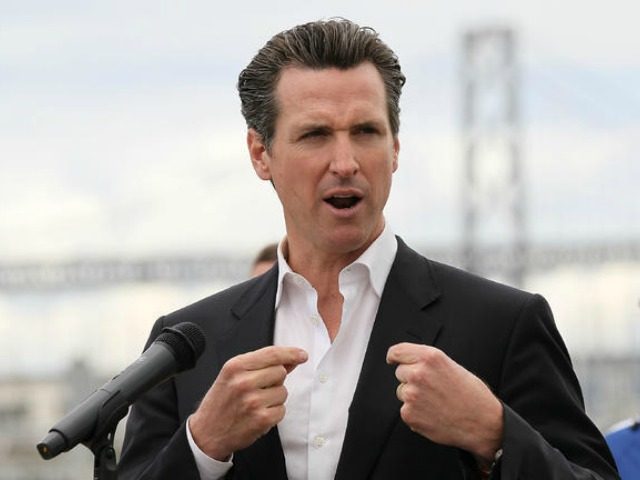Gavin Newsom is ready for his close-up. For the Lieutenant Governor and heir apparent, Tuesday’s California primary was a mere formality, a rite of passage.
His hair was properly slicked back, his teeth impossibly white. His awkward entrance to “California Love” by the late 2Pac (feat. Dr. Dre and Roger Troutman) completed the “bar mitzvah” aesthetic of the whole event.
Newsom has passed eight breezy years in Jerry Brown’s shadow. Now it is his turn.
The Lieutenant Governor’s job is, essentially, to stay out of the way. And Newsom did that to perfection.
In two terms, he had one notable achievement, and it had nothing to do with the responsibilities of his office: he pushed through a gun control referendum in 2016 that requires Californians to obtain a license to buy ammunition, not just the gun into which it is loaded.
It was, like many California laws, sentimental, burdensome, and ineffective.
What was remarkable about that referendum was that it competed with a legislative effort by then-State Senate President pro Tem Kevin de Léon (D-Los Angeles). De Léon had been the state’s chief gun-grabber until Newsom decided he wanted the spotlight. After much infighting, De Léon surrendered.
Instead of gun control, De Léon championed “sanctuary state” laws, painting himself into an ethnic corner from which he has struggled to emerge.
And that is how Gavin Newsom rolls: it is all about him.
In the primary, his campaign supported efforts to back Republican businessman John Cox, so he would not have to face former Los Angeles mayor Antonio Villaraigosa in an expensive all-Democrat runoff.
Shutting Republicans out of the governor’s race would have been helpful to Democrats’ efforts to win key congressional seats and take back the U.S. House. But it was inconvenient for Newsom.
During his tenure as mayor of San Francisco, Newsom made his national reputation by backing gay marriage when it was still illegal. He became a hero to many gay activists. But the truth is that his actions prompted the statewide referendum in 2008, Proposition 8, that enshrined traditional marriage.
Gay marriage might still be illegal in California, thanks to Newsom’s grandstanding, had the Supreme Court not intervened in a 5-4 decision in 2015.
The city he left behind was once America’s jewel, glittering in the prosperity of the tech boom. Today, almost half of Bay Area residents want to leave, driven out by the high cost of living and a burgeoning homeless population.
That is not entirely Newsom’s fault — his successors were no better — but it is a testament to the folly of his style of governance, which puts liberal social priorities first and disdains the tedious business of keeping the city clean and safe.
Newsom radiates confidence. He believes in himself — but it is not clear what else he believes.
He once showed rare political courage in opposing California’s absurd high-speed rail project, which Gov. Brown considers a legacy project. Then he flip-flopped, pleasing the special interests that have climbed aboard the boondoggle to nowhere. Lately, he has glommed onto the idea of free health care for everyone, though he has no plan to pay for it.
Cox’s apparent campaign strategy is to blame Newsom for all of the Democratic Party’s failures in California — the high taxes, the crushing regulations, the influx of illegal aliens, the exodus of the middle class. The sad truth is that the with the exception of the gas tax, the majority of California voters support Newsom’s agenda.
Newsom’s real weak spot is his focus on No. 1. He will have to overcome a record of sacrificing others for his own gain.
He is “Mister Me.” Or, soon, “Governor Me.”
Joel B. Pollak is Senior Editor-at-Large at Breitbart News. He was named to Forward’s 50 “most influential” Jews in 2017. He is the co-author of How Trump Won: The Inside Story of a Revolution, which is available from Regnery. Follow him on Twitter at @joelpollak.

COMMENTS
Please let us know if you're having issues with commenting.